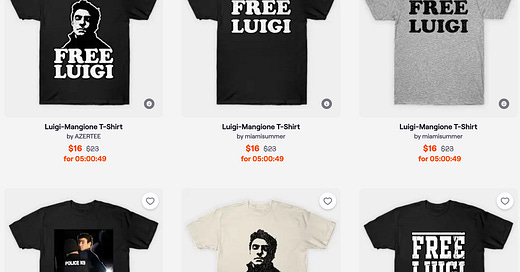America's Empathy Crisis Goes Deeper Than Luigi Mangione
Empathy is a collective value, not just an individual choice.
To many on the internet, UnitedHealthcare CEO assassin, Luigi Mangione, is an overnight folk hero. His good looks and fit physique inspired fan accounts, memes and merch. But these trappings of online irony are now being used to convey an earnest anger about corpo
rate greed. If a dam is breaking in the American psyche, mainstream news networks are quick to patch it over with hollow concerns about civility. A refrain, heard on both Fox News and Don Lemon’s TikTok, is that, yes, health insurance companies are bad, but murder (and celebrating murder) is a step too far. Scott Jennings, a CNN contributor, said in a roundtable discussion that the valorization of Mangione signals that “there’s no respect for life, no respect for our cultural norms.” In a sense, I agree. America does have an empathy problem, but this hand wringing is not just misplaced but downright dishonest. Jennings and his ilk incorrectly assume expressing empathy is an individual responsibility, while ignoring the conditions that make having empathy in America so hard.
Flippant social media posts and dank memes are symptoms of a nation that devalues empathy on a mass scale. Our nation’s policies and culture are not separate entities. They inform each other. UnitedHealth, which, according to ProPublica, denied treatment for low income autistic youth as part of a cost cutting measure, is a microcosm of a larger system that consistently tells individuals their suffering doesn’t matter. Anger over the American healthcare system is nothing new, but 15 years after the passage of Obamacare, genuine reform still feels far away. With political lobbying, insurance industries have shaped electoral politics, influencing policies in their favor, and cutting off everyday Americans from the system intended to give them a politically correct outlet for their grievances. Without a productive outlet, rage festers into a scarcity mindset that encourages self-centeredness.
Americans don’t need an etiquette lesson. No amount of moralizing can stand up to a system that tells you to go without essential medication or sacrifice necessities for the sake of a corporation’s bottom line. The collective realization that Americans are so disillusioned by our healthcare system that murder is an understandable response should be an inflection point. We must understand how deeply our politics shape our humanity. Scolding Americans who can’t muster a tear for Brian Thompson, a man who perpetuated and profited from American antipathy, merely recycles the same neoliberal individualism that got to this point. To those who would rather pay lip service to empathy than confront the cruelty of American capitalism, I’m sorry to report your claim has been denied.





